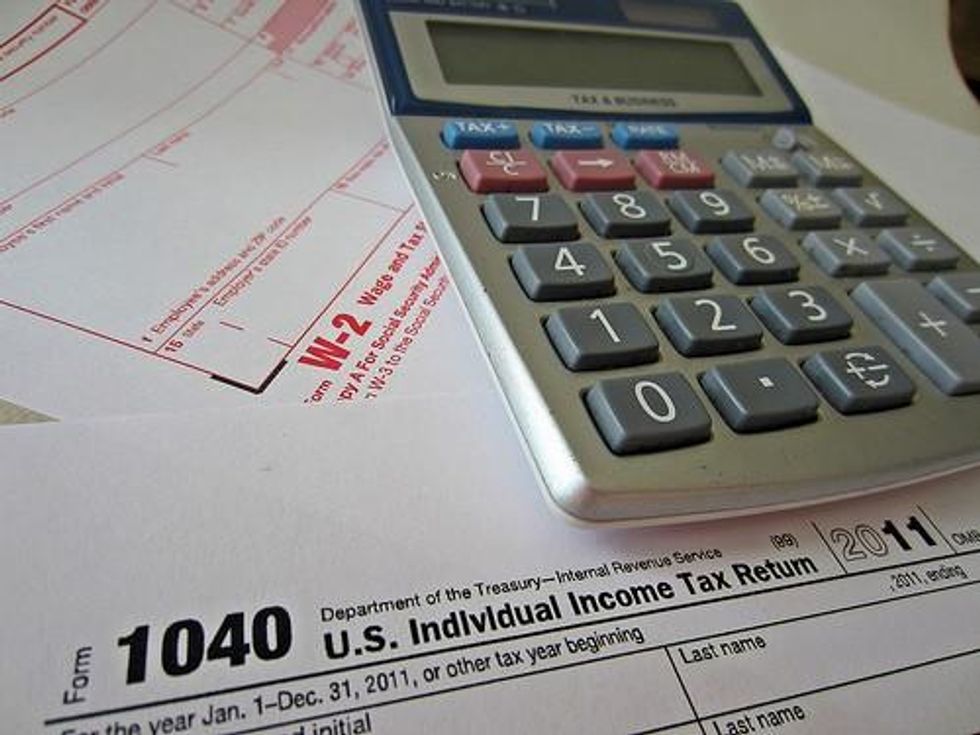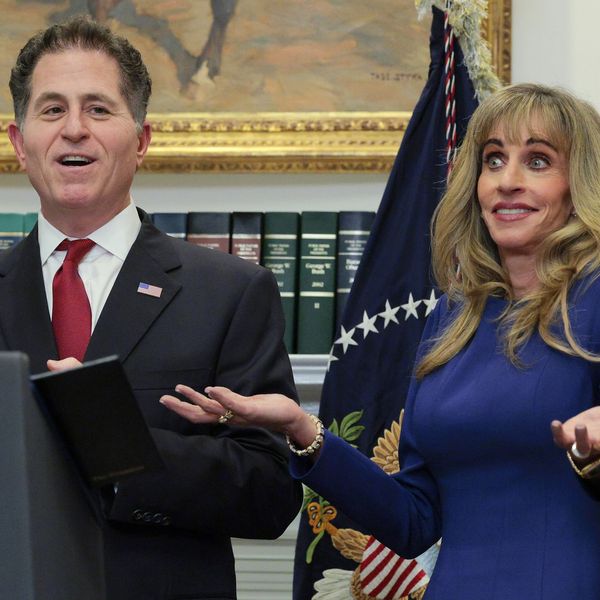Let's Talk Taxes; Let's Talk Trillions
America’s deepest pockets, a new report shows, are saving big bucks from the U.S. tax code’s wide assortment of income tax breaks. They’re saving even more from the absence of a wealth tax.
A hundred years ago, in 1913, Congress wrote into law a federal income tax. Lawmakers have been dotting the tax code, almost ever since, with an assortment of "never-minds" that hand most of us, at one time or another, discounts at tax time.
These discounts can come in handy. If you buy a home, you get to deduct off your taxes the mortgage interest you pay. If you're raising a family, you get to claim tax credit for your

And if you make a killing trading on the stock market, you only have to pay taxes on your windfall at half the normal tax rate.
How much do all these deductions, credits, exclusions, and preferential tax rates cost the federal treasury? Representative Chris Van Hollen, a lawmaker from Maryland, wanted to know. He asked the nonpartisan Congressional Budget Office to calculate exactly how much "tax expenditures" -- the wonky label in Washington for tax never-minds -- were actually totaling.
Van Hollen also asked the CBO to calculate which American taxpayers, by income level, were benefiting the most from these tax expenditures.
Last week, the CBO reported back -- with some big numbers: The top 10 special tax breaks in the federal tax code will cost the federal government $900 billion in 2013 and $12 trillion over the next decade.
And most of the benefits from all these trillions in tax savings, the CBO found, are cascading down to America's most comfortable.
If tax expenditures operated on a totally neutral basis, America's most affluent 1 percent would be receiving just 1 percent of the taxpayer savings that tax expenditures generate. In fact, the CBO calculates, the top 1 percent of U.S. taxpayers are receiving 17 percent of tax expenditure benefits.
Project these numbers over a decade, and the tax savings for America's most affluent really start to add up. Over the next ten years, if current law remains in effect, tax expenditures will pour $3.6 trillion into the pockets of America's top 5 percent of income earners -- and $1.9 trillion into the pockets of America's top 1 percent, households that make over $450,000.
But the enormity of these trillions only hints at how light a tax burden rests on our rich, suggests another new study released last week, the annual global wealth survey from researchers at the Boston Consulting Group.
Just under 5 percent of America's households, says this new study, now hold at least $1 million each in financial wealth, assets like stocks and other securities, the dollars in savings and checking accounts, and the like.
In 2012, the total net worth of these top 5 percent households pumped up America's total financial wealth to $39 trillion, a total a trillion dollars higher than the combined financial wealth of Japan, China, and Germany, the world's next three richest nations.
America's wealthiest households pay no annual federal taxes on any of these trillions. Why? The United States has no annual federal tax on financial wealth.
We do, on the other hand, have a tax on property wealth. This property tax -- a state and local government levy -- essentially amounts to a tax on America's middle class. That's because residential property makes up most of American middle class wealth -- 66 percent, on average, the latest Fed figures show.
For households in America's richest 1 percent, by contrast, home sweet home accounts for only 9.4 percent of household net worth.
In other words, in America today, we tax the wealth of the middle class on an annual basis. We essentially give the wealth of the wealthy a free pass.
Other nations do tax the wealth of the rich. One of these nations, France, has just upped the rates on its "wealth tax." French households with over $21.5 million in wealth are now paying this wealth tax at nearly a 2 percent annual rate.
How much would an annual 2 percent wealth tax raise from America's millionaire households? Recent research from the Deloitte Center for Financial Services can help us here. Deloitte researchers have calculated that American millionaire households in 2011 held $38.6 trillion in total, not just financial, net worth.
In 2020, Deloitte estimates, U.S. households worth at least $1 million will hold $87.1 trillion in wealth, over five times the size of that year's entire estimated federal debt. A 2 percent annual tax on this $87.1 trillion would raise over $1.7 trillion. Some perspective: In 2020, the Congressional Budget Office estimates, the personal income tax bill for all Americans will total $2.16 trillion.
The new CBO numbers on tax expenditures, says Representative Chris Van Hollen from Maryland, show clearly that current federal income tax deductions, credits, exclusions, and preferences skew "disproportionately to the highest 1 percent of income earners."
America's absence of any national annual tax on the wealth of our wealthy skews this lopsided, top-tilting tax picture a good bit more.
An Urgent Message From Our Co-Founder
Dear Common Dreams reader, The U.S. is on a fast track to authoritarianism like nothing I've ever seen. Meanwhile, corporate news outlets are utterly capitulating to Trump, twisting their coverage to avoid drawing his ire while lining up to stuff cash in his pockets. That's why I believe that Common Dreams is doing the best and most consequential reporting that we've ever done. Our small but mighty team is a progressive reporting powerhouse, covering the news every day that the corporate media never will. Our mission has always been simple: To inform. To inspire. And to ignite change for the common good. Now here's the key piece that I want all our readers to understand: None of this would be possible without your financial support. That's not just some fundraising cliche. It's the absolute and literal truth. We don't accept corporate advertising and never will. We don't have a paywall because we don't think people should be blocked from critical news based on their ability to pay. Everything we do is funded by the donations of readers like you. Will you donate now to help power the nonprofit, independent reporting of Common Dreams? Thank you for being a vital member of our community. Together, we can keep independent journalism alive when it’s needed most. - Craig Brown, Co-founder |
A hundred years ago, in 1913, Congress wrote into law a federal income tax. Lawmakers have been dotting the tax code, almost ever since, with an assortment of "never-minds" that hand most of us, at one time or another, discounts at tax time.
These discounts can come in handy. If you buy a home, you get to deduct off your taxes the mortgage interest you pay. If you're raising a family, you get to claim tax credit for your

And if you make a killing trading on the stock market, you only have to pay taxes on your windfall at half the normal tax rate.
How much do all these deductions, credits, exclusions, and preferential tax rates cost the federal treasury? Representative Chris Van Hollen, a lawmaker from Maryland, wanted to know. He asked the nonpartisan Congressional Budget Office to calculate exactly how much "tax expenditures" -- the wonky label in Washington for tax never-minds -- were actually totaling.
Van Hollen also asked the CBO to calculate which American taxpayers, by income level, were benefiting the most from these tax expenditures.
Last week, the CBO reported back -- with some big numbers: The top 10 special tax breaks in the federal tax code will cost the federal government $900 billion in 2013 and $12 trillion over the next decade.
And most of the benefits from all these trillions in tax savings, the CBO found, are cascading down to America's most comfortable.
If tax expenditures operated on a totally neutral basis, America's most affluent 1 percent would be receiving just 1 percent of the taxpayer savings that tax expenditures generate. In fact, the CBO calculates, the top 1 percent of U.S. taxpayers are receiving 17 percent of tax expenditure benefits.
Project these numbers over a decade, and the tax savings for America's most affluent really start to add up. Over the next ten years, if current law remains in effect, tax expenditures will pour $3.6 trillion into the pockets of America's top 5 percent of income earners -- and $1.9 trillion into the pockets of America's top 1 percent, households that make over $450,000.
But the enormity of these trillions only hints at how light a tax burden rests on our rich, suggests another new study released last week, the annual global wealth survey from researchers at the Boston Consulting Group.
Just under 5 percent of America's households, says this new study, now hold at least $1 million each in financial wealth, assets like stocks and other securities, the dollars in savings and checking accounts, and the like.
In 2012, the total net worth of these top 5 percent households pumped up America's total financial wealth to $39 trillion, a total a trillion dollars higher than the combined financial wealth of Japan, China, and Germany, the world's next three richest nations.
America's wealthiest households pay no annual federal taxes on any of these trillions. Why? The United States has no annual federal tax on financial wealth.
We do, on the other hand, have a tax on property wealth. This property tax -- a state and local government levy -- essentially amounts to a tax on America's middle class. That's because residential property makes up most of American middle class wealth -- 66 percent, on average, the latest Fed figures show.
For households in America's richest 1 percent, by contrast, home sweet home accounts for only 9.4 percent of household net worth.
In other words, in America today, we tax the wealth of the middle class on an annual basis. We essentially give the wealth of the wealthy a free pass.
Other nations do tax the wealth of the rich. One of these nations, France, has just upped the rates on its "wealth tax." French households with over $21.5 million in wealth are now paying this wealth tax at nearly a 2 percent annual rate.
How much would an annual 2 percent wealth tax raise from America's millionaire households? Recent research from the Deloitte Center for Financial Services can help us here. Deloitte researchers have calculated that American millionaire households in 2011 held $38.6 trillion in total, not just financial, net worth.
In 2020, Deloitte estimates, U.S. households worth at least $1 million will hold $87.1 trillion in wealth, over five times the size of that year's entire estimated federal debt. A 2 percent annual tax on this $87.1 trillion would raise over $1.7 trillion. Some perspective: In 2020, the Congressional Budget Office estimates, the personal income tax bill for all Americans will total $2.16 trillion.
The new CBO numbers on tax expenditures, says Representative Chris Van Hollen from Maryland, show clearly that current federal income tax deductions, credits, exclusions, and preferences skew "disproportionately to the highest 1 percent of income earners."
America's absence of any national annual tax on the wealth of our wealthy skews this lopsided, top-tilting tax picture a good bit more.
A hundred years ago, in 1913, Congress wrote into law a federal income tax. Lawmakers have been dotting the tax code, almost ever since, with an assortment of "never-minds" that hand most of us, at one time or another, discounts at tax time.
These discounts can come in handy. If you buy a home, you get to deduct off your taxes the mortgage interest you pay. If you're raising a family, you get to claim tax credit for your

And if you make a killing trading on the stock market, you only have to pay taxes on your windfall at half the normal tax rate.
How much do all these deductions, credits, exclusions, and preferential tax rates cost the federal treasury? Representative Chris Van Hollen, a lawmaker from Maryland, wanted to know. He asked the nonpartisan Congressional Budget Office to calculate exactly how much "tax expenditures" -- the wonky label in Washington for tax never-minds -- were actually totaling.
Van Hollen also asked the CBO to calculate which American taxpayers, by income level, were benefiting the most from these tax expenditures.
Last week, the CBO reported back -- with some big numbers: The top 10 special tax breaks in the federal tax code will cost the federal government $900 billion in 2013 and $12 trillion over the next decade.
And most of the benefits from all these trillions in tax savings, the CBO found, are cascading down to America's most comfortable.
If tax expenditures operated on a totally neutral basis, America's most affluent 1 percent would be receiving just 1 percent of the taxpayer savings that tax expenditures generate. In fact, the CBO calculates, the top 1 percent of U.S. taxpayers are receiving 17 percent of tax expenditure benefits.
Project these numbers over a decade, and the tax savings for America's most affluent really start to add up. Over the next ten years, if current law remains in effect, tax expenditures will pour $3.6 trillion into the pockets of America's top 5 percent of income earners -- and $1.9 trillion into the pockets of America's top 1 percent, households that make over $450,000.
But the enormity of these trillions only hints at how light a tax burden rests on our rich, suggests another new study released last week, the annual global wealth survey from researchers at the Boston Consulting Group.
Just under 5 percent of America's households, says this new study, now hold at least $1 million each in financial wealth, assets like stocks and other securities, the dollars in savings and checking accounts, and the like.
In 2012, the total net worth of these top 5 percent households pumped up America's total financial wealth to $39 trillion, a total a trillion dollars higher than the combined financial wealth of Japan, China, and Germany, the world's next three richest nations.
America's wealthiest households pay no annual federal taxes on any of these trillions. Why? The United States has no annual federal tax on financial wealth.
We do, on the other hand, have a tax on property wealth. This property tax -- a state and local government levy -- essentially amounts to a tax on America's middle class. That's because residential property makes up most of American middle class wealth -- 66 percent, on average, the latest Fed figures show.
For households in America's richest 1 percent, by contrast, home sweet home accounts for only 9.4 percent of household net worth.
In other words, in America today, we tax the wealth of the middle class on an annual basis. We essentially give the wealth of the wealthy a free pass.
Other nations do tax the wealth of the rich. One of these nations, France, has just upped the rates on its "wealth tax." French households with over $21.5 million in wealth are now paying this wealth tax at nearly a 2 percent annual rate.
How much would an annual 2 percent wealth tax raise from America's millionaire households? Recent research from the Deloitte Center for Financial Services can help us here. Deloitte researchers have calculated that American millionaire households in 2011 held $38.6 trillion in total, not just financial, net worth.
In 2020, Deloitte estimates, U.S. households worth at least $1 million will hold $87.1 trillion in wealth, over five times the size of that year's entire estimated federal debt. A 2 percent annual tax on this $87.1 trillion would raise over $1.7 trillion. Some perspective: In 2020, the Congressional Budget Office estimates, the personal income tax bill for all Americans will total $2.16 trillion.
The new CBO numbers on tax expenditures, says Representative Chris Van Hollen from Maryland, show clearly that current federal income tax deductions, credits, exclusions, and preferences skew "disproportionately to the highest 1 percent of income earners."
America's absence of any national annual tax on the wealth of our wealthy skews this lopsided, top-tilting tax picture a good bit more.

